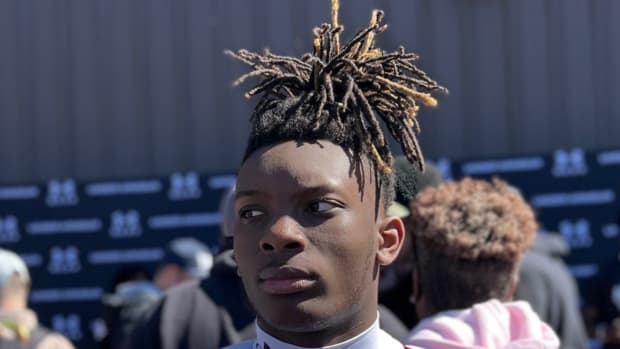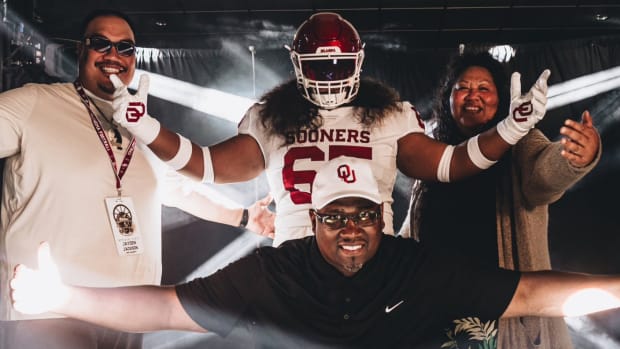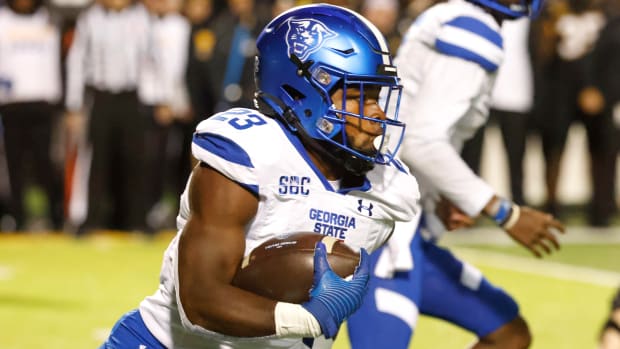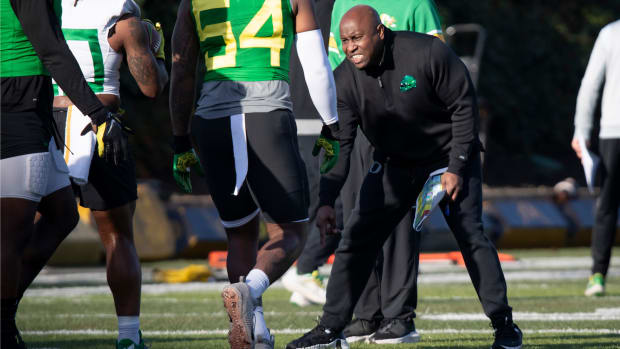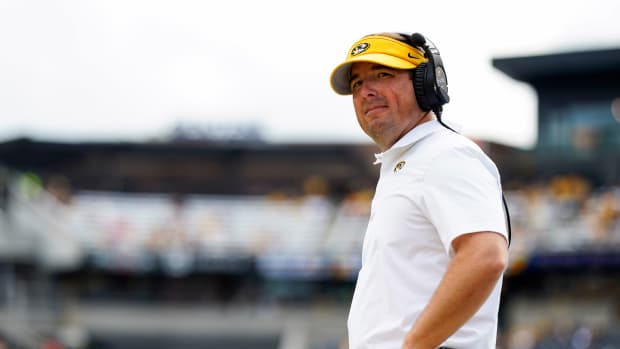Why the NCAA Is Taking a Massive Step Just by Discussing Athletes’ Path to Profit
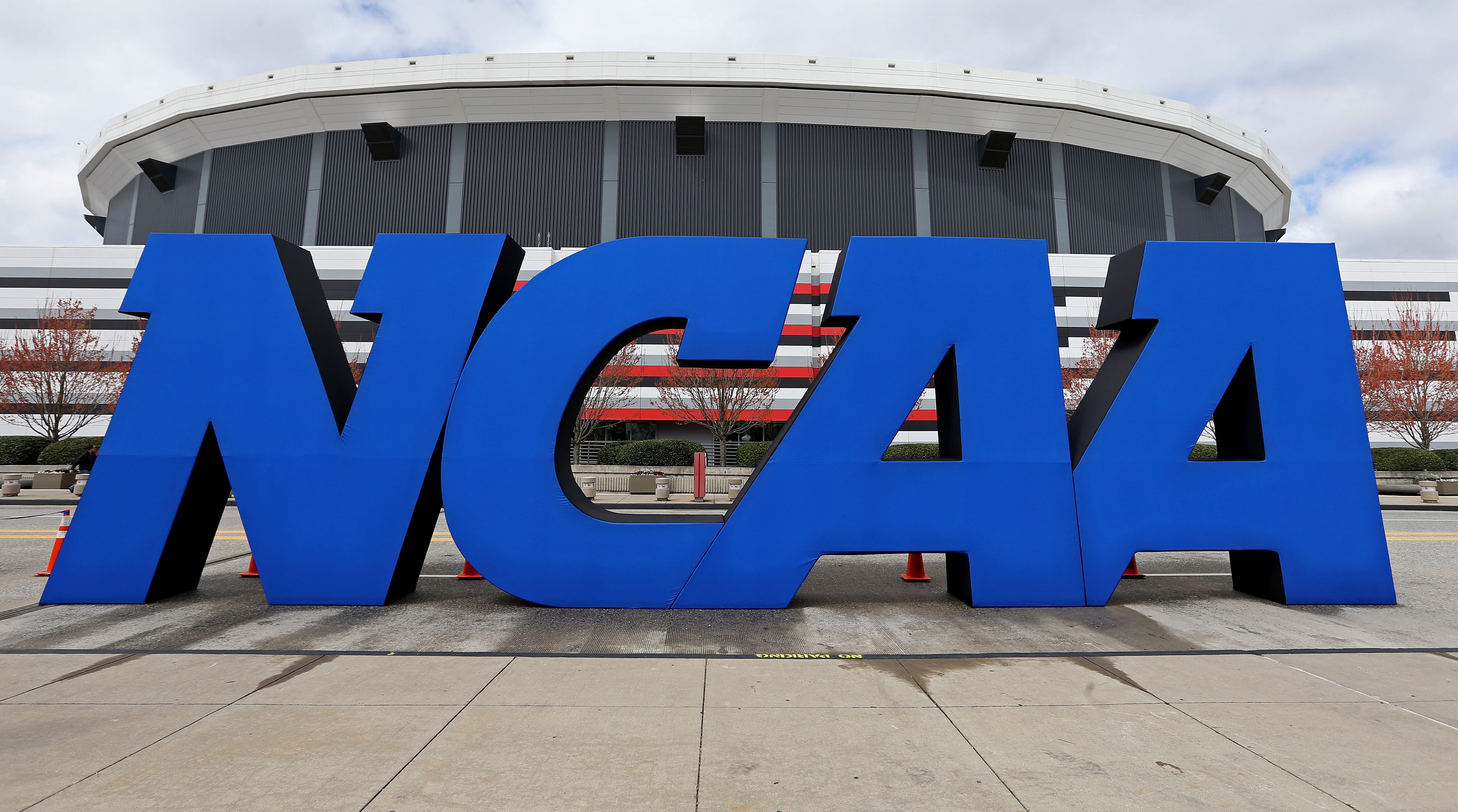
They’re actually going to talk about it.
You may have seen the news Tuesday that the NCAA has established a working group to discuss the prospect of allowing athletes to profit off their name, image and likeness rights and thought, “Great, another working group that will lead to the formation of a subcommittee that will lead to the formation of a committee.” I wouldn’t blame you. Nobody throws a meeting that leads to another meeting quite like the NCAA.
But here’s the thing: They’re actually going to talk about it.
When I started covering college sports professionally in 2000, no NCAA official, no athletic director, no coach would have dared entertain the thought of a serious conversation about athletes being allowed to make money off their names. When I wrote this column for SI in 2011 suggesting that a lot of the issues in college sports could be handled by switching to the Olympic model—allowing outside sources to pay athletes while schools continued to pay only tuition, room and board—none of those people would even entertain the thought. In 2015, when a federal judge ruled against the NCAA in a suit brought by former UCLA basketball star Ed O’Bannon in a case specifically about name, image and likeness rights, it still felt like a win for the NCAA because the judge imposed an arbitrary cap on what those rights might be worth—which wasn’t any different than the schools’ decisions to create NCAA rules that capped the value of those rights at $0. Still, no one who mattered wanted to have a real discussion.
But now, in 2019, they’re actually going to talk about it.
This feels like the schools and the NCAA have accepted that they’ll eventually have to cross the Rubicon and accept reality on reality’s terms. Skyrocketing coaching salaries, antitrust lawsuits and a federal investigation into college basketball that snared a bunch of nobodies and revealed how the recruiting sausage gets made (pretty cheaply, relatively speaking) have pushed them into this discussion. Now we’ll find out if they’re willing to use their imaginations so they can head off more lawsuits and create a sensible way to administer the multibillion-dollar business they’ve created.
(And maybe let us have our freaking college football video game back. EA Sports wants to make another college football game. But it won’t do it in violation of the law. It needs an avenue to compensate the players depicted in the game. This could create that avenue.)
Mark Walker isn’t quite sure how serious the NCAA and schools are about all of this. Walker is the Republican congressman from North Carolina who earlier this year introduced a bill in the House Ways and Means Committee that would strip the NCAA of its tax-tax-exempt status if it doesn’t allow players to profit from their NIL rights. “I want to make sure there’s more action than smoke,” Walker says. “There have been other meetings in the past. I’m going to be positive that hopefully there’s some motivation to really come out of this with a game plan.”
Walker knows all about bureaucratic tar pits. He works in one. “I thought Congress was good at beating issues into the ground,” Walker says. “But we may have to pay homage to the NCAA if they can’t get something done here.”
Perhaps I’m overly optimistic because I’m shocked they’re talking about it at all, but I think there’s a chance they get something done here. Slowly but surely, the pragmatists have replaced the Pollyannas. The school officials whose decisions populate the NCAA rulebook have grown tired of the lawsuits. They know the NCAA has become a convenient punching bag. Think about it. In one of the most fractured times in our nation’s history, the bipartisan sponsorship of Walker’s bill means that one of the few things Republicans and Democrats can agree on is their hatred of the NCAA.
I also know that like everyone else, the people who run college sports would rather make their own policies than have the government impose policies on them. That’s why this line from Ohio State athletic director Gene Smith in the NCAA’s press release was telling: “While the formation of this group is an important step to confirming what we believe as an association, the group’s work will not result in paying students as employees,” said Smith, the co-chair of the working group. “That structure is contrary to the NCAA’s educational mission and will not be a part of this discussion.”
The “not result in paying students as employees” phrasing seems intentionally chosen to match the language in Walker’s bill. This is important for the schools, because paying the athletes as employees opens a Pandora’s Box of employment law, worker’s compensation and Title IX issues. But letting other people pay the athletes doesn’t.
This next part will test how much school officials have learned. If they’re smart, they’ll create a system in which anyone who wants to pay an athlete to advertise a product or sign an autograph or write a book can do just that without the athlete fearing a loss of eligibility. Would this mean boosters might pay a star quarterback a bunch of money for an autograph signing? You bet it would. But if the schools try to place more than a few minimal restrictions on who can pay and why—gamblers paying to fix games could (and should) still be banned, obviously—they’ll discover that they’ve created an even bigger headache than the lawsuits they’re trying to avoid.
Some ADs or school presidents likely will claim that this will drive the best players to the athletic departments with the most fervent boosters. They will claim this will hurt competitive equity in college football. Anyone who says that should be laughed at repeatedly, though. There is no competitive equity in college football. Who has a legitimate chance to win the next national title? Clemson and Alabama, who have met in three of the last four national title games. Maybe Georgia, Ohio State or Oklahoma. But probably just Clemson and Alabama. It isn’t possible to have any less competitive equity in college football. Heck, a fairly loose policy might allow SMU boosters to fire up the Trans-Ams and get their school back in the game.
Will the athletes have to pay taxes on what they make? Sure. Will they need to honor their deals? Yep. But they’re legal adults, so they’ll have to figure out how to handle it. And if we learned anything from the college basketball trials—spoiler alert: we didn’t—it’s that even with multinational corporations doing the paying, the dollar amounts usually don’t rise above five figures. And if schools wanted to, they could charge the athletes a licensing fee. They could tell them they can’t turn a profit until they pay back their scholarships. They won’t, though. That would hurt recruiting.
Probably the only college athlete of the past five years who could command anything close to seven figures is Duke basketball player Zion Williamson. He moved the meter that much. The two most valuable college athletes now are Alabama quarterback Tua Tagovailoa and Clemson quarterback Trevor Lawrence. But their appeal is still fairly regional. They would crack six figures. Most other players would command far less. The bulk would get no more than their scholarship. That’s what the market would dictate.
To pull this off, a bunch of people who work at the schools would have to ignore that they were conditioned for a century to believe that it was evil if an athlete got even a penny more than his or her scholarship paid. Those people will have to realize the truth that someone who has never been exposed to college sports would understand intrinsically: There’s nothing wrong with giving someone money because they’re good at sports. Literally no one is harmed.
We’ll see how quickly the working group moves. Any holdup likely will come from an argument between the pragmatists and the true believers who can’t see past decades of brainwashing. Who will win? It’s the NCAA, so it’s tough to bet on the pragmatists.
Still, they’re actually going to talk about it. That’s a massive step.
Meanwhile, they’ll be watching on Capitol Hill. “We’re going to monitor what comes out of this,” Walker says. “If this is just another thing where we hear they’re just going to create another talking group for the next couple of years, we’re going to raise a stink about it.”
And what would keep them from raising that stink? “A plan of action, even if it’s not immediately implemented, to say ‘Over the next two to five years, this is the course of action steps we’re going to take to make sure these student-athletes have access to the free market like other students and like every other American,’” Walker says. “If there is a game plan to do something like that, then we’re going to applaud them and work with them to try to see that come to fruition. But if it’s more hyperbole, then I’m going to beat the drum even louder.”

